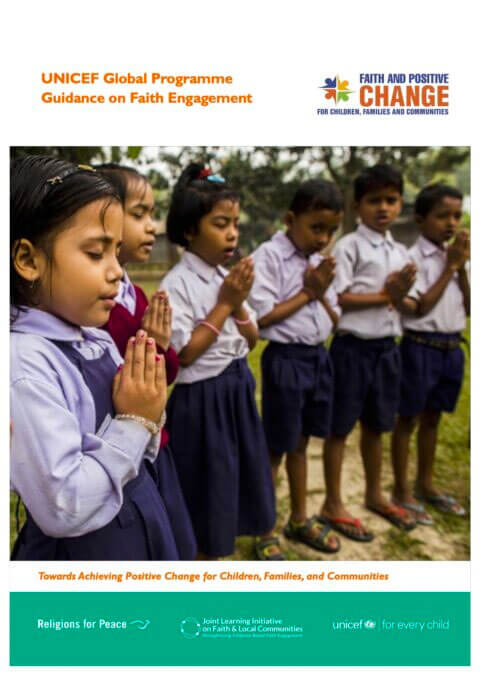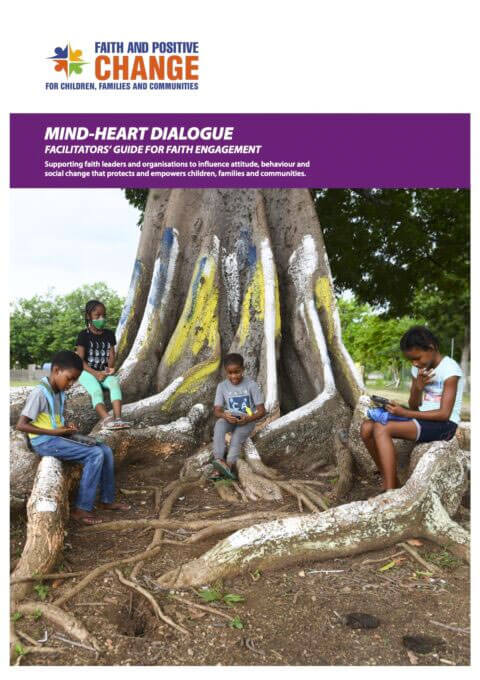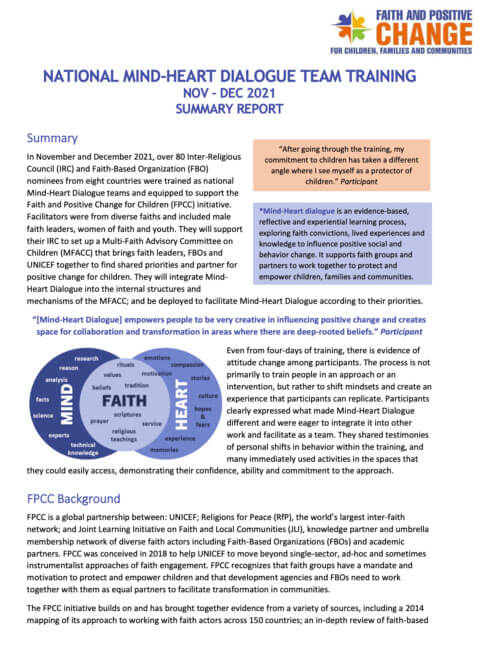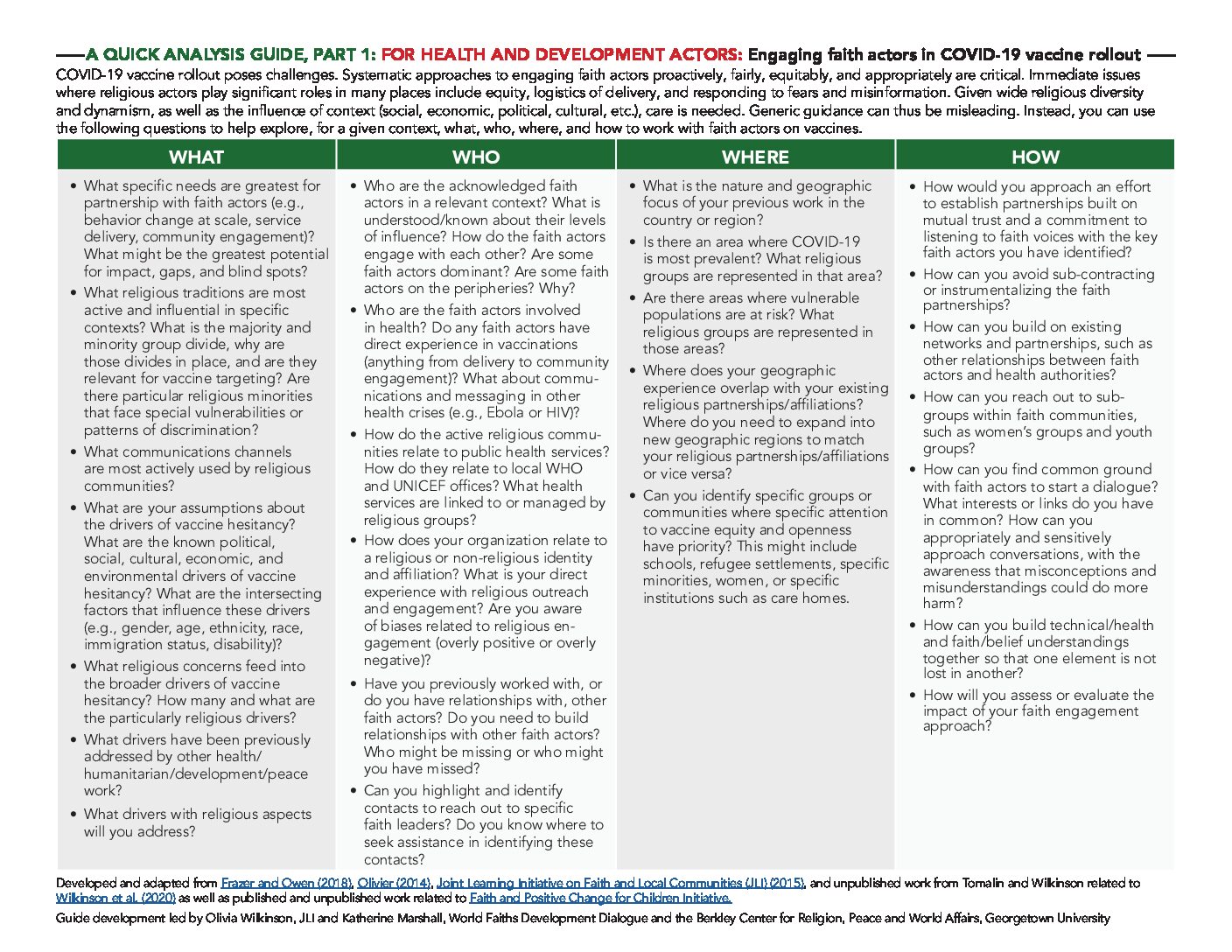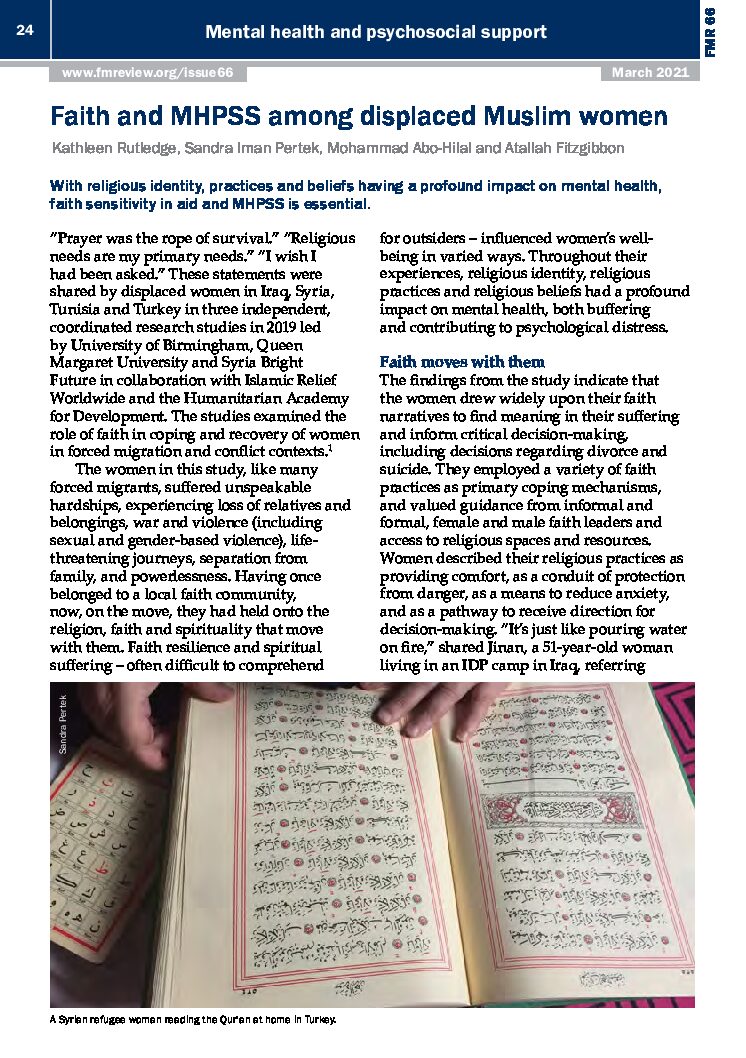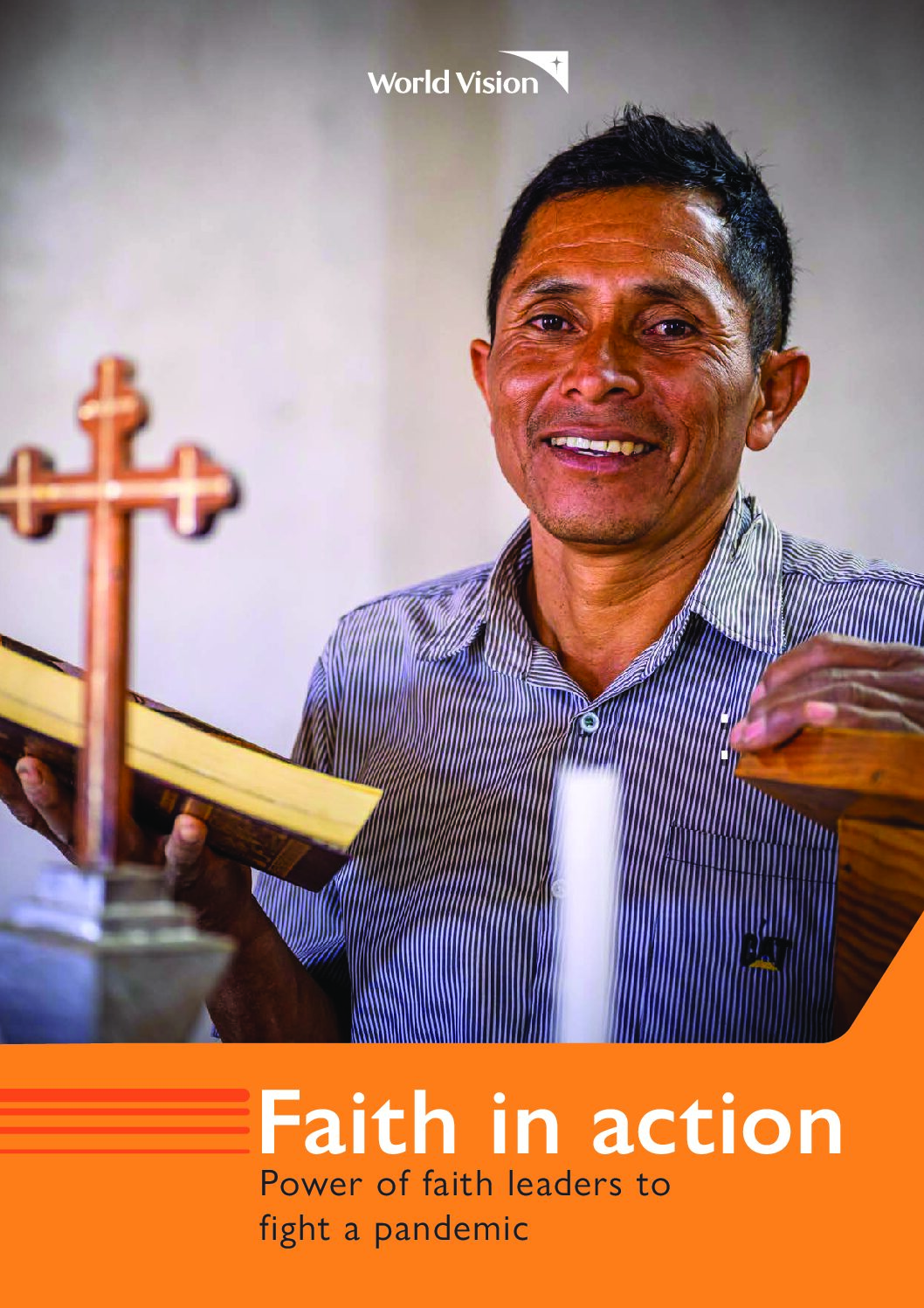
The Joint Learning Initiative on Faith and Local Communities (JLI) is partnering with UNICEF and Religions for Peace on Faith and Positive Change for Children, Families and Communities: Global Initiative on Social and Behaviour Change. This is a collaboration with the UNICEF Communication for Development in Programme Division and the Civil Society Partnerships Unit in the Division of Communication. The project looks across sectors including health, development, protection, and empowerment of children, especially focusing on the most marginalized, across the life-cycle.
Purpose
Conceived in 2018, the Faith and Positive Change for Children, Families and Communities initiative (FPCC) aims to move beyond single-sector, single-faith, small-scale, ad-hoc and sometimes instrumentalist approaches of faith engagement in development and humanitarian work.
The FPCC model incorporates three main components:
- Faith-centered research and mapping to ensure evidence-based and contextually-appropriate approaches,
- Experiential training of FPCC facilitators to ensure interactive and reflective Mind-Heart Dialogue approaches to address issues affecting children, and
- Establishment of sustainable inter-faith coordination and partnership mechanisms for on-going planning, implementation and oversight.
At country level, this includes faith groups, FBOs and UNICEF country office staff linked to existing country-level inter-religious Councils.
At Regional level, Tripartite Advisory groups (RfP, JLI/FBOs and UNICEF are being established to guide and support the roll-out of FPCC. FPCC was first piloted in ESAR (East and Southern Africa), and WCAR (West and Central Africa) and is now being replicated in other regions: ROSA (South Asia); MENA (Middle East and North Africa) and LACR (Latin America and the Caribbean). Elements of FPCC are also being implemented in ECAR (Europe and Central Asia) with primary focus on Migrants and Refugees and in EAPR (East Asia and Pacific).
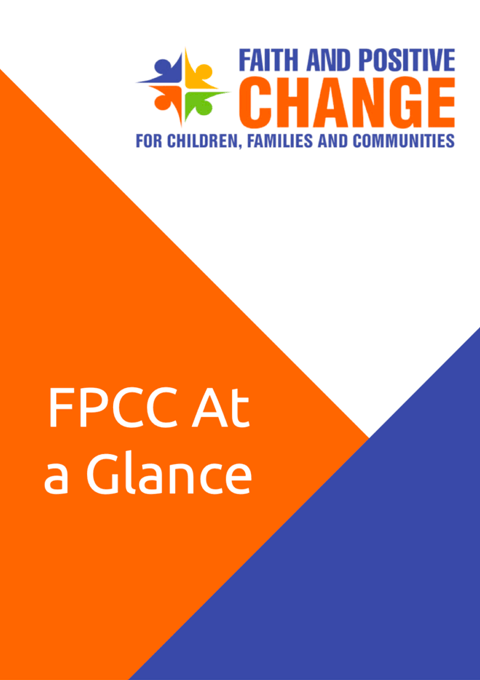
Introductory videos to FPCC
Part 1
Part 2
Programme Guidance & Facilitators’ Guide
FPCC has released two major documents that cover its core Mind-Heart Dialogue approach and guidance on faith engagement (further project updates covered below). The two documents provide a comprehensive overview of how to implement Mind-Heart Dialogue (Facilitators Guide), including participatory exercises and templates for online and in-person sessions, and how to implement faith engagement (Program Guidance), including key principles for faith engagement and step-by-step actions throughout a program cycle.
Faith-in-Action Guidance Documents
Guidance on key challenges in addressing COVID-19, recommended actions and related multi-religious teachings including resources from technical partners, UNICEF, WHO, IFRC, and the COVID-19 Initiative Reference Document (above). These are intended for local adaptation and use by religious leaders, faith communities, and faith-based organizations at national and community levels.



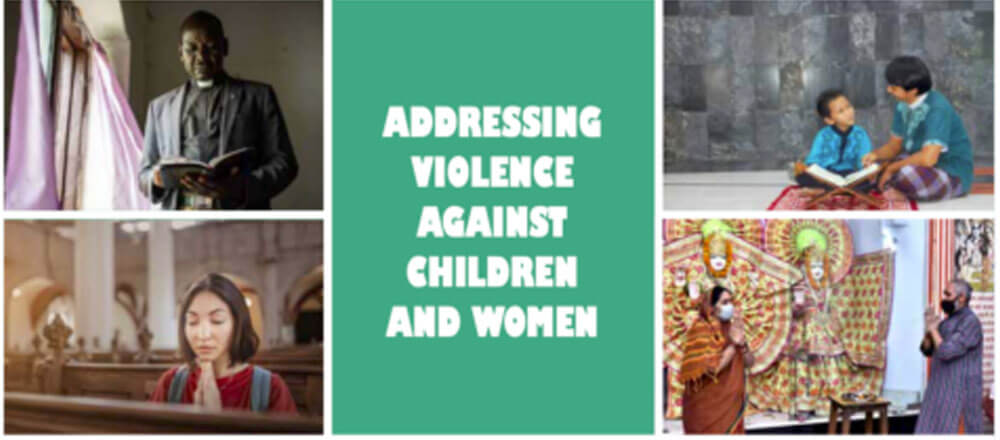
2023 Progress
JLI signed two new agreements with UNICEF in 2023: one with the UNICEF Latin America and Caribbean Office (LACRO) and one with the Global HQ to cover the regions of South Asia (SAR), East and Southern Africa (ESAR) and West and Central Africa (WCAR).
Three FPCC Regional Coordinators and an FPCC Global Manager were hired in May and June as the core partners of the FPCC Initiative felt more regional representation would be helpful in ensuring progress on numerous deliverables.
WESTERN, CENTRAL, EASTERN & SOUTHERN AFRICA
Two surveys were carried out in the region this year:a Multi-Faith Action Coordination Committees (MFACCs) survey to determine the level of MFACCs operationalization in Africa and an annual Mind-Heart Dialogue monitoring survey to document its implementation status in Africa.
JLI, together with its regional training partner CORAT coordinated with ACRL to roll out in-person MHD refresher training in Zambia, South Sudan, Malawi, Sierra Leone and Burkina Faso. This provided an opportunity to further gather feedback on MHD implementation, expose facilitators to aspects of the reviewed MHD guide and develop action plans for the year 2024.
SOUTH ASIA
FPCC South Asia held its Regional Advisory Group (RAG) Workshop of Faith Actors for Child Rights and Well-Being, enhancing collaboration and positive change for adolescent girls in Sri Lanka. A report on the RAG meeting is available in the JLI resource library.
The Region hosted its Mind-Heart Dialogue Training of Trainers in Kathmandu. Organized and facilitated by partner and regional training institute Sarvodaya, the MHD TOT trained 34 trainers from eight countries in South Asia in partnership with UNICEF and Religions for Peace. Preliminary joint action planning was begun for the national rollout of FPCC. These national action plans are expected to include formation of Multi-Faith Action Coordination Committees for Children (MFACCs), national Mind Heart Dialogue facilitators training & MEAL Framework Rollout in eight countries of South Asia (India, Pakistan, Sri Lanka, Nepal, Bhutan, Maldives, Bangladesh and Afghanistan). The national action plans will be implemented throughout 2024.
LATIN AMERICA & THE CARIBBEAN
A mapping exercise was conducted with a methodology designed to deepen knowledge on the work on children’s rights carried out by FBOs in Latin America and the Caribbean. A series of virtual National Sessions were conducted with partners in El Salvador, Guatemala, the Dominican Republic and Brazil to discuss the information gathered through the survey as well as the preliminary mapping activities done in 2022.
A Regional Planning Committee was established with participation of UNICEF Regional Social and Behaviour Change (SBC), Religions for Peace, JLI and Arigatou. This committee has met on a regular basis to plan for the Regional Forum that will take place in February 2024.
UNICEF LACRO also translated FPCC foundational documents in Spanish, Portuguese (Brazil) and French. They can be found in JLI’s resource library.
2022 Progress
The First South Asia Regional Strategic Faith Engagement Forum for Positive Change for Children, Families and Communities was held from the 8th to 10th May 2022 in Kathmandu, Nepal.
This ‘Forum’ brought together religious leaders, faith actors, faith-based organizations and UNICEF South Asia representatives to develop the first South Asia Regional Faith and Positive Change for Children (FPCC) Strategy.
It built on the initial consultations held virtually during the South Asia High-Level Forum for Faith Actors on the 8th December 2021 where commitments to work together on system strengthening of local faith communities for positive change for children, families and communities in South Asia were made.
2021 Progress
High Level Religious Leaders Meeting combined with launching of the Regional Religious Leaders’ Advisory Group
In December 2021, religious leaders/faith actors and FBOs operating at country level, including Ministries and state bodies in charge of religious affairs in 8 countries launched the ROSA Faith Engagement Task Force to develop the first draft of the Regional Religious Leaders’ Engagement Strategy and Workplan and the content of a Declaration of Commitment. A Regional Faith Engagement Forum will take place in May 2022 to discuss the draft Regional Faith Engagement Strategy and Workplan and the Declaration of Commitment, to further articulate these documents, validate them and incorporate relevant activities or linkages with the work of other partners as relevant.
National Mind-Heart Dialogue Team Training
In November and December 2021, over 80 Inter-Religious Council (IRC) and Faith-Based Organization (FBO) nominees from eight countries were trained as national Mind-Heart Dialogue teams and equipped to support the Faith and Positive Change for Children (FPCC) initiative. Facilitators were from diverse faiths and included male faith leaders, women of faith and youth. They will support their IRC to set up a Multi-Faith Advisory Committee on Children (MFACC) that brings faith leaders, FBOs and UNICEF together to find shared priorities and partner for positive change for children. They will integrate Mind- Heart Dialogue into the internal structures and mechanisms of the MFACC; and be deployed to facilitate Mind-Heart Dialogue according to their priorities.
2020 Progress
In November and December 2020, the partners initiated trainings in East and Southern Africa. Read more about the first training here
As of June 2020, the partners held eight regional webinars to increase awareness and strengthen coordinated efforts through the global Faith-in-Action campaign, to mobilize inter-faith commitments of Religious Leaders and Faith representatives including Women of Faith and Interfaith Youth Network Members to support the specific calls to action; to equip these influencers with a standard set of global guidance with messages and resources that can be customized for local use and to share existing examples of best practices to motivate others
- COVID-19 Initiative Reference Document for Religious Leaders and Faith Communities Guidance, Ed 1, April 2020: existing faith-based resources compiled by JLI in collaboration with multiple partners
- Global Multi-religious Faith in Action COVID-19 Initiative launched April 2020, see initiative statement here
- The FPCC launches first virtual ‘Mind and Heart Dialogue Training‘ series to support faith leaders during COVID-19 in Eastern and Southern Africa.
2019 FPCC WorkRock: Reports from Early Adopter Countries
FPCC WorkRock is a participatory process to develop a country-specific Journey of Change for Children. Convened by national faith councils and UNICEF, diverse religious leaders, including women and youth, came together with UNICEF Country Office representatives for an intensive four day WorkRock. Inspired by mind heart dialogue, participants drew on their own childhood experiences, formative research they conducted with children and youth in their own communities, and their experiences regarding children’s needs, to spotlight priorities for positive change for children in their communities, and to develop a detailed Journey of Change strategy to address the issue(s). They framed action plans at personal, institutional and national levels, in some cases formalized in the form of Declarations, and made commitments to collaboration and change.
The summary reports for each country can be found below, along with WorkRock key documents and resources shared with all participants.
2018 Partnership Achievements
Literature review- 91 resources reviewed in-depth, whittled down from 1600+
17 country-specific case studies from interviews with Faith Actor Partner (e.g. Inter-Religious Council of Leaders, Faith-based Universities, National FBOs and faith-based networks), Government Partner, and UNICEF on partnerships – 42 people interviewed
Country mapping & Bangkok consultation
Content review – 27 toolkits reviewed
Draft Theory of Change development consultation with 13 institutions

